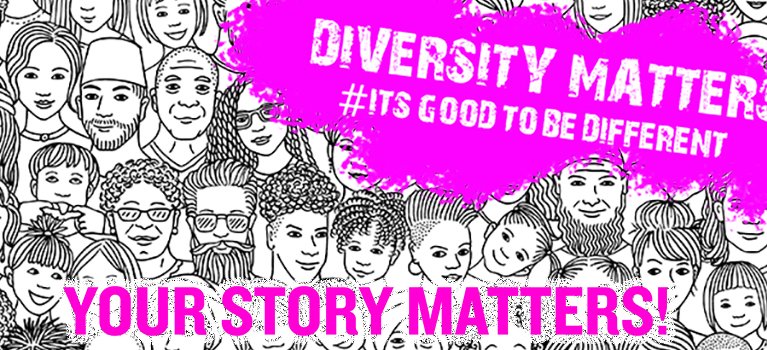Migration: Your Story Matters
The page was researched and published from November 2020 to February 2021.
Diversity is not about the others, it is about you!
Diversity means a variety of people and ways of life.
With “diversity matters – your story matters,” a student project in the Sports, Culture, & Event Management bachelor degree program, the project group tells real stories to
- call more attention to the topics of migration and integration.
- offer students with a migrant background a platform with all information relevant to the topic of studying at the University of Applied Sciences Kufstein Tirol.
- make it easier for future students with a migrant background to come to the university of applied sciences and to break down barriers.
- show that diversity and variety are a positive development in our society.
Links to networking! Join us!
Things to know about the project & topic
Written interview with Christine Haage, BA
Officer for inclusion, gender, & diversity at the University of Applied Sciences Kufstein Tirol
- What is your connection to the topic of migration?
I am an Austrian, but I have been living in Germany in the Munich area for 29 years. We might not actually feel like that is a foreign country, but I myself have been able to experience a lot of hindrances, problems with integration, as well as with public authority services. However, I was always able to deal with it well because of my knowledge of the language in contrast to migrants who do not know the German language and had to leave their homes because they feared for their lives or left for other major reasons.
- What does migration mean to you?
Migration of itself means “to wander” – a very natural process before humanity in its history settled down but also a process that happened afterwards. Our human culture is characterized by these wanderings. For me personally, migration means to constantly be working on being in contact with my surroundings and to attentively notice differences without giving up myself or my culture in the process. For me, migration is a process of communication between people without a shallow adjustment. It is especially important to maintain your individuality. However, integration can only take place between people who are not rigid but are willing to learn from each other. Tolerance and respect are absolutely necessary for this.
- How long have you been the officer for inclusion, gender, & diversity at the University of Applied Sciences Kufstein Tirol, and how did this come about?
I have been the officer for gender & diversity since 2010 and the officer for people with disabilities since 2015 for the University of Applied Sciences Kufstein Tirol. I am convinced that I am performing a very meaningful task that involves more than just my work. It is still my desire to work on changing society, to generate empathy for other people, to make inequality visible, and to advocate for a better coexistence.
- What tasks are you confronted with as the officer for inclusion, gender, & diversity?
There is a wide variety of tasks. At first, my work was dedicated to creating networks with other higher education institutions and complying with legal requirements in consultation with the university management. Later when my area of responsibility grew, internal structures were added such as founding a work group. A regular, annual event with students about diversity topics as well as direct care for disabled students were also added as time went on. In principle, my high-priority work is to establish reasonable, organizational concepts in order to dedicate myself within the university of applied sciences to issues such as advancement of women, equality, anti-discrimination, inclusion, and to make these concepts visible outside of the university of applied sciences.
- What was your personal highlight during this time, and which story touched you the most?
I am most impressed by people who are disadvantaged by a quirk of fate and reach the same goals as everyone else by tremendous willpower and exertion. I have seen this in many areas and not only with disabled people. It seems that when apparent weaknesses or disadvantages are accepted and coped with they become the basis for the greatest strength for these personalities. This is a very beneficial thought for me because it shows that almost everything can be managed.
- What do you personally see as the greatest hurdle for people with a migrant background that could prevent them from obtaining a university of applied sciences or university degree?
I think that first of all the greatest hurdle is the language. If communication is hindered at this level, everything beyond this will only move forward at a slow pace. The wave of refugees in 2015 showed that recognition of certificates of admission for an education at a higher education institution was a big problem. People who are fleeing often have no papers anymore, or the papers have to be translated with much effort. Another hurdle then was the time it took to gain recognition of migrant status. Migrant status was associated with financial aspects such as a work permit, self-sufficiency, and waving the tuition fee.
- Where do you see areas for improvement at the university of applied sciences when it comes to integration?
Life at the university of applied sciences is a mirror of our society. We cannot put aside prejudices and personal attitudes at the door like we put a jacket on a coat rack. There are always areas where we can work on being more benevolent. Within the university of applied sciences, there is room to point out injustices or unequal treatment. There is room for learning, curiosity, and forming opinions and not only for students. In this area, activities that encourage us to think can have a big impact.
- What is your position on the topic of diversity, and what can be done to promote diversity in everyday student life?
Diversity and a variety are good. We see from a wide variety of studies that diverse teams work better, that they work more effectively, and that different, diverse viewpoints produce better concepts and strategies. Multicultural groups are more resilient and less susceptible to political agitation. We are an international institution, and we send all bachelor students outside of the country for at least one semester. We also host about 200 foreign incoming students per year. I think we have already highly dedicated ourselves to a very diverse basic concept that includes all people at the university of applied sciences. Nevertheless, we can still continue to work on living out a culture that questions and reflects on the status quo and is not afraid of change.
We would like to thank you very much that you took time for this important topic and helped us with the “diversity matters” practical project!
Written interview with Petra Kübler
Re-entry and Equal Opportunity Officer at AMS Kufstein
- What exactly can we imagine that the job title equal opportunity officer would mean, and what are the core tasks that you are confronted with?
My tasks at AMS as the equal opportunity officer include developing and deciding on AMS course offers along with management, ensuring equality in the context of course offers, helping women look for work, and supporting and accelerating women when it comes to further education. I also deal with providing information about career opportunities for women, the effects of work on pensions, as well as opportunities on the job market versus segregation of the job market.
- How and why did you come to this job, and how long have you been working in this profession? (Was there perhaps a momentous event that brought you to this profession?)
Even as a child it was clear to me that it’s a men’s world. This influenced me as a girl, and it is certainly a reason why I landed where I work today. I have always been busy supporting and motivating people when I think back over my career path, which included things like self-employment and then work as a trainer in the private education sector that finally led me to AMS. The topic of equality at work has been with me for 15 years now. Since I had to struggle with discrimination in my childhood as a girl, today I help women on their way back into the working world although it is still not free of discrimination and unequal treatment.
- What are the unanswered questions or concerns that especially people with a migrant background come to you with? (Maybe the most common consultation process in this situation regarding integration)
The examples cited below are listed by frequency:
- The most common topic is inquiries about language courses.
- Financial support for child care and in general financial aid opportunities.
- Vocational training desires/further education opportunities/school-leaving qualifications are also relevant.
- Requests to consultation centers that help women with problems in their families.
- Are there specific documents or conditions that people with a migrant background must comply with to be able to exercise/learn a profession or to be able to study at a school/university of applied sciences/university?
The most important thing is the language. It is the key for every other kind of progress whether the goal is a study program, training program, or work. The admission criteria for a study program or for universities of applied sciences in Austria also apply to people with a migrant background. Depending on whether we are talking about training or a study program, the language level B to C on the European Language Framework is required and is now integrated into admission tests for almost all fields of study at universities and also into admission tests for universities of applied sciences.
The language is also the key to success for vocational training. An apprenticeship is concluded by a final apprenticeship examination that is certainly easier to manage if a person’s knowledge of the language is adequate.
- Are there specific support or assistance programs for people with a migrant background such as for school-based training or vocational training?
AMS has its own support and training programs for adolescents with a mandatory school-leaving qualification or without a school-leaving qualification. This is where the statutory training obligation for people under 25 years old takes hold, and it is also an official mandate given to AMS. AMS additionally focuses on people over 25 years old who do not have any training. And in my position as the equal opportunity officer, I am obligated to support and advise women about this. This means that AMS does not ask the question whether a person has a migrant background or not, but if they do not have any training AMS supports them as a person. Similarly, when continuing education is the key to success, AMS provides support regardless of gender, origin, or degree of migration to the extent permitted by law.
- What are the greatest challenges or hindrances for people with a migrant background who want to attend school or graduate from a study program?
Education and parents are decisive for the development and opportunities that children have. I see this day by day in the work that I perform in my position as an equal opportunity officer and also as an advisor of people who are re-entering the workforce. The challenges that can be hindrances are insufficient knowledge of the language, the “mental influence” of the culture and way of life in the country of origin, or if someone is born in Austria, the culture inherited from their parents and family in contrast to the established culture and way of living.
- Do you have any personal advice on this for people with a migrant background that you normally like to give people to take with them from your counseling sessions?
Regardless of where I come from and who I am if I have opportunities to shape my life, then I use these opportunities regardless of what family, friends, or whoever say about it. It is my life. I have to live it myself, and there are opportunities to do this in Austria.
- What has been your personal highlight during your career in the area of migration & integration? What story especially touched you?
One of my clients who moved to Austria because of her husband and was completely dependent on him in the beginning learned German from the range of courses that AMS offers. She received training, found work with the help of AMS, and did it even though she had small children. She had a different culture. However, it was clear to her that she needed to adjust her life to have an opportunity. This is what she said from the beginning. With her very rudimentary vocabulary, she told me at the first meeting, “I to live here and must learn German is important.” I think this statement is significant. When we get together, I am proud that I was able to help her on her way and experience how she has developed into a self-reliant person over time who has also been able to become financially independent. This woman really used her opportunities and made something out of her life. It was definitely not always easy, also with children, but it was doable!
We would like to thank you very much that you took time for this important topic and helped us with the “diversity matters” practical project!
Terminology: migration, integration, and diversity
Migration
Migration means leaving your normal environment to aspire to a better quality of life. It is not necessarily about fleeing [1]. There are various forms of migration that can be structured differently depending on the motives for the new beginning, including: education, work, ethnic motives, fleeing, and a few others [2]. Leaving your normal environment is not a process that takes place spontaneously without consideration. A long period of time for consideration and a lot of planning are necessary to give up your place of origin [3]. The wave of refugees in 2015 gave the term “migration” a completely new meaning in our society, and it is often seen as something negative. However, the desire to strive for a better quality of life is as old as humanity itself [4].
Integration
The term “integration” became very important to the migration debate [5]. The word “integration” comes from Latin, and it means something like incorporating or making one unit out of various elements [6]. You can also somewhat expand the interpretation of the term integration from the viewpoint of social interaction of a society and say that it means: “people with various cultural or other backgrounds living together as one unit with equal rights.” [7] Integration, then, has something to do with equality, which is reinforced when you look at political dimensions seen today.
The most important task of integration policy worldwide is to ask questions about legal equality, to reduce discrimination, and to advocate for mutual acceptance and support [8].
Diversity
The word “diversity” comes from Latin and means “differentness” or “multiplicity” [9]. Actually the term comes from biology from the term “biodiversity” [10]. From the viewpoint of societal policy, diversity is equated with anti-discrimination and equality for all individuals. The term “diversity” was primarily shaped in the 1960s and 1970s in the USA in the battle against racism that was mainly towards blacks [11]. “In the literature, various dimensions of differences between people are included in diversity: ethnic and cultural origin, gender, health/disability, sexual orientation, age, and also sometimes access to resources such as educational opportunities and money” [12].
In contrast to integration, diversity is about the concept of deliberate, respectful interaction with each other [13]. The most important goals of diversity are reducing discrimination and promoting equal opportunity for all genders as well as for people from various nations [14].
Why is diversity important to a higher education institution? Why do we need it?
We humans get to know diversity or differentness as soon as we move into groups beyond the family structure. From our early childhood, we become aware of inequalities among us, and the terms bullying, marginalization, and discrimination often unfortunately go hand-in-hand with inequality.
As a higher education institution, the University of Applied Sciences Kufstein Tirol is a key point in the development of many young people. Year after year students entrust themselves to us to work on perfecting their education. That is a sign of great trust!
We do not want to break their trust in us. A comprehensive education not only includes conveying modern, contemporary content but also includes setting high standards of the newest theories, methods, and teaching principles.
Diversity is very important to the university of applied sciences since it is an international meeting place. For more than 20 years, we have been sending students across the world to become familiar with other forms of teaching, languages, cultures, ways of life, mentalities, and to learn to not rashly judge unfamiliar things. It is a very effective method to learn open-mindedness and to realize that many roads lead to Rome. The University of Applied Sciences Kufstein Tirol is now a meeting place for students from 50 nations who can expect an environment without bullying, marginalization, or discrimination. It is important to convey to the students to not devalue or pass judgment on people because of their gender, disabilities, age, sexual identity, ethnicity, origin, nationality, or worldview. It is worth working on this to have better, more purposeful cooperation (Christine Haage, BA, University of Applied Sciences Diversity Officer).
References:
1 u. 3) Han, P. (2016). Soziologie der Migration. Stuttgart: UTB.
2) Polat, A. (15. 10 2018). Migration [online]. Abgerufen am 02. 12 2020 von socialnet Lexicon: https://www.socialnet.de/lexikon/Migration
4) Heckmann, F. (2014). Integration von Migranten. Wiesbaden: Springer Fachmedien.
5) Esser, H. (2001). Arbeitspapiere - Mannheimer Zentrum für Europäische Sozialforschung Nr.40. Von http://www.mzes.uni-mannheim.de/ abgerufen
6 u. 8) Bundesausländerbeauftragte.de. (2009). Integration in Deutschland. Von http://www.bundesauslaenderbeauftragte.de/integration.html abgerufen
7) Becker, R. (2011). Integration durch Bildung. Wiesbaden: Springer Fachmedien Wiesbaden GmbH.
9) Schlote, E., & Götz, M. (02 2010). Was ist Diversität/Diversity? BR Online, S. 8. Abgerufen am 2020 von http://www.br-online.de/jugend/izi/deutsch/publikation/televizion/23_2010_2/diversitaet.pdf
10/11/12) Gerland, J., Keuchel, S., & Merkt, I. (2016). Kunst, Kultur und Inklusion Teilhabe am künstlerischen Arbeitsmarkt. Von Schriftenreihe Netzwerk Kultur und Inklusion Bd. 1: https://kultur-und-inklusion.net/wp-content/uploads/2016/09/Netzwerk_Kultur_Inklusion_Tagungs-Dokumentation.pdf abgerufen
13) Mor, B. (2017). Managing Diversity. Sotuh California: SAGE Publications.
Allemann - Ghionda, C. (2013). Bildung für alle, Diversiät und Inklusion: Internationale Perspektiven. Paderborn: Ferdinand Schöningh GmbH & CO. KG.
Prengel, A. (2018). Pädagogik der Vielfalt. Wiesbaden: Springer Fachmedien GmbH.
Students and lecturers from all over the world have responded to the invitation to share their story for the “diversity matters, your story matters” project. From the Netherlands, India, the USA and Africa. A young man from Ghana contacted us to tell us his experiences as a student at the University of Applied Sciences Kufstein Tirol.
“I have never seen a real ski lift”
This 24-year-old man was born and grew up in Ghana. That is where he attended his bachelor degree program for Integrated Business Studies Management and completed it.
A friend whom he has known since kindergarten is attending a similar study program in Germany. He told him about the renowned university of applied sciences in Tirol and advised him to enroll there. He took the opportunity, and this is why the young man from Ghana has been attending the master study program International Business Studies at the University of Applied Sciences Kufstein Tirol since November 2020.
Although he is very much looking forward to the famous Austrian cuisine that he has heard so much about already and can hardly wait to finally go up a mountain with a ski lift and come down on skis, this young man has not been able to make it to Kufstein as of today. Although he wanted to come to Tirol in 2019, dealing with official business is very tedious and complicated, and it is not exactly easy to receive the required documents. The global corona pandemic made it even worse.
“It is very difficult to get a visa in Ghana. The Austrian embassy is kilometers away, and it takes a lot of time and money to visit it. It is not possible for everyone.”
Currently, our student from Ghana is still at home and can only attend the lectures for the study program virtually. Fortunately, all lectures are only taking place virtually anyway because of the current Covid-19 pandemic.
He told us in our interview that studying in Kufstein is not much more difficult for him than in Ghana. The online program is excellent and clear, and the subject matter is not more difficult than at his former university.
Although he has not been to Austria, he has still noticed some differences between him and his fellow students. “Austrians are all very friendly, but they are very individualistic and self-centered. A good example of this is that the school system in Ghana is different from the school system in Austria, and I do not always understand everything. Hardly anyone from my group makes the effort to help me and explain things to me that I do not understand.”
All in all, this young man from Ghana will be happy when he can finally come to Kufstein and make new experiences in another country.
“I have never seen a real ski lift and already am very much looking forward to my initial attempts at winter sports. Hopefully, I will be able to finally come to Kufstein in 2021.”
If we all want to experience humanity, then we all must act humanly!
Diversity means a variety of people and ways of life. The goal of diversity is recognizing and appreciating all people regardless of their social or ethnic origin, their gender, their sexual orientation, their religious affiliation, their worldview, their age, their physical or mental abilities, or other characteristics. It is not only about the dissimilarity of people and their lifestyles, but it is always about discovering their similarities too. Diversity is a positive, societal alternative to marginalization and discrimination. For our society, implementing diversity means every individual’s opportunity to completely develop by overcoming societal barriers and institutional discrimination and thus implementing human rights for each individual.
It is necessary to develop courses of action and strategies step-by-step in order to define diversity, which will lead to a diverse and fair society. Prejudices and ideologies that justify discrimination in societal institutions and structures can only be overcome if we all take the initiative to change them.
This is exactly why we would like to point the way with our “diversity matters – your story matters” project and our website. Diversity is not about the others, it is about you!
Our goal is to show other students, professors, members of staff at the university of applied sciences, all of Kufstein, all of Tirol, and actually every person that diversity and variety are a positive development in our society.
We want to use “diversity matters – your story matters” to tell real stories to call more attention to the topics of migration & integration and to offer students with a migrant background a platform with all information relevant to the topic of studying at the University of Applied Sciences Kufstein Tirol. Together we can set another milestone and ensure that it is also easier for future students with a migrant background to come to the university of applied sciences in Kufstein and can ensure that barriers are broken down.
Your diversity matters team
Your story matters
Approximately 155,000 migrants live in Tirol, and approximately 120,000 of them were born outside of Austria. The following text only refers to those born outside of Austria unless explicit reference is made to migrants.
Almost two-thirds of these foreigners come from EU countries. Approximately one-third of these immigrants in Tirol come from Germany alone, whereas all of the immigrants coming from successor countries of Yugoslavia and from Turkey only total to a good one-quarter of the immigrants. Foreigners from Asian or African countries only total to approximately 11%, and only approximately 0.5% of them are stateless or have an unclarified origin. Overall, about one of every five people living in Tirol have a migrant background. On a percentage basis, Kufstein is in fifth place among the districts with the most foreigners in Tirol1.
When it comes to demographic data, it should be mentioned that the differences are hardly worth mentioning between migrants and Austrians. For example, the numbers of men and women in both groups are almost balanced although the number of men is slightly higher2.
Differences can merely be found when it comes to age distribution. In the total population of Tirol, the 50 to 59-year-olds are the most strongly represented age group with a good 15%. However, the most strongly represented age group of migrants is the 30 to 39-year-olds. They are closely followed by the 20 to 29-year-olds3. This means that for migrants the age bracket with the working population is more strongly represented while the groups of people at retirement age or older and children are represented at a lower rate than the overall population. This means that among migrants there is a comparatively high proportion of persons who are or could become potential students.
References:
1) Office of the State Government of Tirol – Regional Development and Statistics Department (2019) (HR). Demographic data of Tirol 2018. Home page of the State of Tirol, pp. 22-32. Accessed 12/04/2020 https://www.tirol.gv.at/fileadmin/themen/statistik-budget/statistik/downloads/BEV2018.pdf
2) Office of the State Government of Tirol – Regional Development and Statistics Department (2019) (HR). Demographic data of Tirol 2018. Home page of the State of Tirol, pp. 22-32. Accessed 12/04/2020 https://www.tirol.gv.at/fileadmin/themen/statistik-budget/statistik/downloads/BEV2018.pdf
3 and 2) Office of the State Government of Tirol – Regional Development and Statistics Department (2019) (HR). Demographic data of Tirol 2018. Home page of the State of Tirol, pp. 22-32. Accessed 12/04/2020 https://www.tirol.gv.at/fileadmin/themen/statistik-budget/statistik/downloads/BEV2018.pdf
Addresses & consultation centers
for migrants and immigrants in Tirol
You can find a collection of various sources of information here. The links are also integrated as buttons (to the right) on this page.
- Public Employment Service (AMS) Kufstein
https://www.ams.at/regionen/tirol/geschaeftsstellen/ams-kufstein - Center for Migrants in Tirol (ZeMit)
https://www.zemit.at/de/ - Information and Monitoring Center for migration and integration in Tirol (IMZ)
https://imz-tirol.at/ - Library of the Tirol IMZ
https://imz-tirol.at/imz-bibliothek.html - AST Tirol & Vorarlberg – contact point for people who obtained professional qualifications abroad
https://www.anlaufstelle-anerkennung.at/anlaufstellen - State of Tirol – integration programs for immigrants in Tirol
https://www.tirol.gv.at/gesellschaft-soziales/diversitaet/integrationsangebote-fuer-zugewanderte-in-tirol/ - Austrian Integration Fund – important information and programs for refugees and immigrants
https://www.integrationsfonds.at/zielgruppen/fluechtlinge-und-zuwanderinnen - Diakonie Refugee Service – independent counseling in Tirol
https://fluechtlingsdienst.diakonie.at/ - Stories of migration in Tirol – collect – archive – teach
https://dam.tirol/ - Here at home – stories of migration from Tirol
https://hier-zuhause.at/
All consultation and information centers as a download (PDF):
Personal stories & highlights
- Interview with AMS Kufstein (Public Employment Service)
An interview with Petra Kübler, Re-entry and Equal Opportunity Officer, about consultation topics affecting people with a migrant background. - Interview with ZeMit (Center for Migrants in Tirol)
An interview with MMag.a. Dr. Bediha Yildiz, Labor and Socio-Political Advisor, regarding hindrances to admission to a study program for people with a migrant background and how ZeMiT can help them with this. - Your story matters: personal stories
Personal insights into the life of students and lecturers at the University of Applied Sciences Kufstein Tirol.
Written interview with Petra Kübler
Re-entry and Equal Opportunity Officer at AMS Kufstein
- What exactly can we imagine that the job title equal opportunity officer would mean, and what are the core tasks that you are confronted with?
My tasks at AMS as the equal opportunity officer include developing and deciding on AMS course offers along with management, ensuring equality in the context of course offers, helping women look for work, and supporting and accelerating women when it comes to further education. I also deal with providing information about career opportunities for women, the effects of work on pensions, as well as opportunities on the job market versus segregation of the job market.
- How and why did you come to this job, and how long have you been working in this profession? (Was there perhaps a momentous event that brought you to this profession?)
Even as a child it was clear to me that it’s a men’s world. This influenced me as a girl, and it is certainly a reason why I landed where I work today. I have always been busy supporting and motivating people when I think back over my career path, which included things like self-employment and then work as a trainer in the private education sector that finally led me to AMS. The topic of equality at work has been with me for 15 years now. Since I had to struggle with discrimination in my childhood as a girl, today I help women on their way back into the working world although it is still not free of discrimination and unequal treatment.
- What are the unanswered questions or concerns that especially people with a migrant background come to you with? (Maybe the most common consultation process in this situation regarding integration)
The examples cited below are listed by frequency:
- The most common topic is inquiries about language courses.
- Financial support for child care and in general financial aid opportunities.
- Vocational training desires/further education opportunities/school-leaving qualifications are also relevant.
- Requests to consultation centers that help women with problems in their families.
- Are there specific documents or conditions that people with a migrant background must comply with to be able to exercise/learn a profession or to be able to study at a school/university of applied sciences/university?
The most important thing is the language. It is the key for every other kind of progress whether the goal is a study program, training program, or work. The admission criteria for a study program or for universities of applied sciences in Austria also apply to people with a migrant background. Depending on whether we are talking about training or a study program, the language level B to C on the European Language Framework is required and is now integrated into admission tests for almost all fields of study at universities and also into admission tests for universities of applied sciences.
The language is also the key to success for vocational training. An apprenticeship is concluded by a final apprenticeship examination that is certainly easier to manage if a person’s knowledge of the language is adequate.
- Are there specific support or assistance programs for people with a migrant background such as for school-based training or vocational training?
AMS has its own support and training programs for adolescents with a mandatory school-leaving qualification or without a school-leaving qualification. This is where the statutory training obligation for people under 25 years old takes hold, and it is also an official mandate given to AMS. AMS additionally focuses on people over 25 years old who do not have any training. And in my position as the equal opportunity officer, I am obligated to support and advise women about this. This means that AMS does not ask the question whether a person has a migrant background or not, but if they do not have any training AMS supports them as a person. Similarly, when continuing education is the key to success, AMS provides support regardless of gender, origin, or degree of migration to the extent permitted by law.
- What are the greatest challenges or hindrances for people with a migrant background who want to attend school or graduate from a study program?
Education and parents are decisive for the development and opportunities that children have. I see this day by day in the work that I perform in my position as an equal opportunity officer and also as an advisor of people who are re-entering the workforce. The challenges that can be hindrances are insufficient knowledge of the language, the “mental influence” of the culture and way of life in the country of origin, or if someone is born in Austria, the culture inherited from their parents and family in contrast to the established culture and way of living.
- Do you have any personal advice on this for people with a migrant background that you normally like to give people to take with them from your counseling sessions?
Regardless of where I come from and who I am if I have opportunities to shape my life, then I use these opportunities regardless of what family, friends, or whoever say about it. It is my life. I have to live it myself, and there are opportunities to do this in Austria.
- What has been your personal highlight during your career in the area of migration & integration? What story especially touched you?
One of my clients who moved to Austria because of her husband and was completely dependent on him in the beginning learned German from the range of courses that AMS offers. She received training, found work with the help of AMS, and did it even though she had small children. She had a different culture. However, it was clear to her that she needed to adjust her life to have an opportunity. This is what she said from the beginning. With her very rudimentary vocabulary, she told me at the first meeting, “I to live here and must learn German is important.” I think this statement is significant. When we get together, I am proud that I was able to help her on her way and experience how she has developed into a self-reliant person over time who has also been able to become financially independent. This woman really used her opportunities and made something out of her life. It was definitely not always easy, also with children, but it was doable!
We would like to thank you very much that you took time for this important topic and helped us with the “diversity matters” practical project!
Students and lecturers from all over the world have responded to the invitation to share their story for the “diversity matters, your story matters” project. From the Netherlands, India, the USA and Africa. A young man from Ghana contacted us to tell us his experiences as a student at the University of Applied Sciences Kufstein Tirol.
“I have never seen a real ski lift”
This 24-year-old man was born and grew up in Ghana. That is where he attended his bachelor degree program for Integrated Business Studies Management and completed it.
A friend whom he has known since kindergarten is attending a similar study program in Germany. He told him about the renowned university of applied sciences in Tirol and advised him to enroll there. He took the opportunity, and this is why the young man from Ghana has been attending the master study program International Business Studies at the University of Applied Sciences Kufstein Tirol since November 2020.
Although he is very much looking forward to the famous Austrian cuisine that he has heard so much about already and can hardly wait to finally go up a mountain with a ski lift and come down on skis, this young man has not been able to make it to Kufstein as of today. Although he wanted to come to Tirol in 2019, dealing with official business is very tedious and complicated, and it is not exactly easy to receive the required documents. The global corona pandemic made it even worse.
“It is very difficult to get a visa in Ghana. The Austrian embassy is kilometers away, and it takes a lot of time and money to visit it. It is not possible for everyone.”
Currently, our student from Ghana is still at home and can only attend the lectures for the study program virtually. Fortunately, all lectures are only taking place virtually anyway because of the current Covid-19 pandemic.
He told us in our interview that studying in Kufstein is not much more difficult for him than in Ghana. The online program is excellent and clear, and the subject matter is not more difficult than at his former university.
Although he has not been to Austria, he has still noticed some differences between him and his fellow students. “Austrians are all very friendly, but they are very individualistic and self-centered. A good example of this is that the school system in Ghana is different from the school system in Austria, and I do not always understand everything. Hardly anyone from my group makes the effort to help me and explain things to me that I do not understand.”
All in all, this young man from Ghana will be happy when he can finally come to Kufstein and make new experiences in another country.
“I have never seen a real ski lift and already am very much looking forward to my initial attempts at winter sports. Hopefully, I will be able to finally come to Kufstein in 2021.”
Your story matters: Interview with Amulya, a student
Amulya is a student and reports about her integration at the University of Applied Sciences Kufstein Tirol as an international student in the International Business Studies master program. Her roots are in India, and she reflects on the differences compared to her culture. Amulya, a 28-year-old student at the University of Applied Sciences Kufstein Tirol, was born more than 6,600 kilometers away. She talks about her personal experiences and impressions in an interview...
Your story matters: Interview with Joost, a student
Joost is a student and reports about his integration at the University of Applied Sciences Kufstein Tirol as an international student of Sports, Culture & Event Management. He comes from the Netherlands and reports about his impressions and experiences in Austria. Joost is an SCEM student who actually only wanted to stay in Austria for half of a year to work as a ski teacher. Find out in this video why he still lives in Austria now after 6 years and why he has started studying at the University of Applied Sciences Kufstein Tirol.
Your story matters: ZeMiT interview with Bediha Yildiz
The Center for Migrants in Tirol (ZeMiT) offers confidential, independent, free consultations in multiple languages for people with a migrant background for legal and social issues. MMag.a. Dr. Bediha Yildiz, Labor and Socio-Political Advisor, talks about hindrances to admission to a study program for people with a migrant background and reports how ZeMiT can help them with this.












